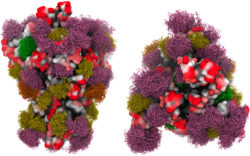The dog days of summer are all but over in Athens, with UGA students back in town and fall semester underway. The pandemic, both nationally and locally, is no longer of any grave concern to many, with the prevailing public sentiment being that life must go on. Confidence in vaccines—which have remained effective thus far at preventing severe illness, hospitalization and death—alongside general pandemic fatigue and the push from state and federal government to be good stewards of the economy have all helped fuel the current complacent state of mind about COVID-19 that has left the virus largely unchecked and spreading freely for months now.
UGA Stops Surveillance Testing and Reporting Cases
The CDC’s relaxed recommendations both last spring and last week signaled to the public, other institutions and businesses that people should take on the task of personal risk assessment on their own terms. Despite the latest Omicron BA.5 variant wave, the American public has shown no signs of willingness to return to previous preventive measures.
UGA’s approach to policy for the fall is no exception. In line with the CDC’s spring announcement, UGA’s COVID-19 Medical Oversight Task Force announced that most COVID-19 prevention measures—including surveillance testing, weekly data updates, incentivized vaccination campaigns and outreach on campus—would be discontinued at the end of the spring semester, with the caveat that they would change course if the state of the pandemic warranted it. According to Rod Guajardo, director for integrated media communications at UGA, the university has “not received any updates from the University System of Georgia that would alter this response on any of our campuses.”
Despite public sentiment, public health experts insist that the virus is still a very real danger. COVID-19 is still with us, causing death and illness daily. For the week of Aug. 3–10, Georgia had 26,000 confirmed cases, nearly 1,000 new hospitalizations and 124 deaths. In Clarke County, there were 371 new cases in the last two weeks, the seven-day running average has hovered around 25 or 30 new cases a day, and six Clarke County residents died from COVID-19 in the last month.
Given the prevalence of at-home tests, which are not reported to the Georgia Department of Public Health, DPH data is a vast undercount of the amount of viral spread that is actually occurring. Further complicating matters for understanding viral levels and community spread is how college students are classified. They are often not included in Clarke County data, but instead are attributed to the county and home address listed on student driver’s licenses. More often than not, this means that students are counted in data for their hometown.
UGA’s discontinuation of surveillance testing and weekly updates will mean that the university community will no longer have any reliable means to gauge viral spread on campus, and the Athens community will have a less accurate picture of the state of the pandemic locally. The availability of reliable data has been shown to help deter risky behavior and curb community spread.
“The [University System of Georgia] has been back to normal since the mask mandate disappeared in summer 2021. But now with few schools publicly reporting cases, we as faculty and students are flying blind about how COVID is doing on campus,” said Matthew Boedy, a University of North Georgia professor who has been a staunch advocate for stronger campus protections and accountability by Georgia colleges and universities. “Yes, nationally, it’s ‘COVID is over,’ and cases are not spiking right now. But USG and the [Board of] Regents have long given up showing concern about COVID. And yes, [Gov. Brian] Kemp wants it that way.”

Wastewater Data’s Importance Grows
With a lack of robust data from official institutions, wastewater monitoring has become even more important in gauging the true state of the pandemic. In Athens, professor Erin Lipp at UGA’s Center for the Ecology of Infectious Diseases has been testing wastewater since the onset of the pandemic. Her lab currently tests viral levels at three wastewater facilities twice a week.
“Without robust clinical surveillance and testing, we are heading into the fall a bit more blind than we have for the past two years,” Lipp said. “Even though UGA’s surveillance program was based on voluntary testing, it provided a significant testing resource and a good indication of the state of transmission among the UGA population. We are losing that important data source this year. Furthermore, while readily available at-home tests have been a great tool for individuals to monitor their own health, it has also reduced the need for clinical testing, and those at-home tested cases are not captured in official case reports. These are the times where wastewater testing is probably best suited as a surveillance tool. It has emerged as a robust indicator of viral transmission and general disease burden in a population, and is especially relevant when clinical testing is at low levels.”
As UGA begins classes again, wastewater data shows that viral levels have plateaued in recent weeks but still remain at very high levels. A comparison of DPH data from August 2021 to August 2022 shows just how much the virus is spreading unchecked in Clarke County. On Aug. 10, 2021, the seven-day moving average was 38.3 new cases per day, with 13.6% of all tests coming back positive. In 2022, the seven-day moving average was 28.3 daily cases on Aug. 10, but 29.2% of all tests came back positive, indicating that not enough testing is being done.
“Based on the last two years, I suspect that we will see increased cases of COVID-19 and higher rates of viral transmission,” Lipp said. “Given the large population influx and increased interactions among different groups, there is a higher likelihood of spread. Although we are currently at a plateau in terms of wastewater load, the levels are still very high [70th percentile among all samples]. In prior years, we have come into August at lower levels, so the dynamics are a little different this year, but I anticipate that levels will increase further.”
Lipp’s research, however, is in danger of being discontinued soon. Due to lack of continued funding, which has only been secured through the end of August, wastewater data will also be less robust in the near future. Private donations will continue to fund a pared-down wastewater surveillance effort, with just one wastewater location being tested each week instead of the three that are now being tested. Lipp said that she is continuing to try and find the means to continue funding this research.
The most transmissible version of the virus so far, the omicron BA.5 variant, has proven to be quite adept at evading immunity. While hospitalizations, severe illness and deaths have not surged to levels similar to other waves, the unchecked spread of the virus this summer may very well mean that a new, more contagious and more fatal variant could be on the horizon this winter.
Students Can Stop the Spread
More than two years of data has shown that college students’ risk of illness and death from COVID-19 has been minimal. For Clarke County, only two residents under the age of 30 have died from COVID-19, but both have been in recent months. (One UGA student died in 2021 but apparently was not counted as a Clarke County resident.) While there is a lower risk for most college students, students can also be superspreaders and are not the only population on campus.
The available data for Clarke and surrounding counties continues to show that COVID-19 is a real threat for many. In the Northeast Health District, which includes 10 surrounding counties, six out of every 100 cases still result in hospitalization, and one out of 100 cases has resulted in death. In the past 14 days, there have been 1,997 new cases, 145 new hospitalizations and 12 deaths in the 10-county area. Nationally, COVID-19 is still the fourth-leading cause of death.
Jayne Morgan, a cardiologist and executive director of the Piedmont Hospital System COVID-19 task force, is hopeful that students will be mindful of what is really occurring in their communities this fall. “There is always the potential of another variant that could be more lethal. That is the worst case scenario against which public health officials and the scientific and medical community have the greatest concern,” she said.
The long-term effects of repeated infections, which increase the likelihood of “long COVID” and associated symptoms, such as memory loss and chronic exhaustion, are still largely unknown.
“Long COVID is a real thing. 10–15% of those who have been infected will suffer long-term medical and health issues, independent of whether they were sick or not during the infection,” Morgan said. “That is the irony. One could be sicker later on without COVID than you were with COVID. Generally, the worse your symptoms, however, the greater the risk of long COVID that has consequences of disability for some [and can cause] chronic shortness of breath, the inability to climb stairs, difficulty with memory and the loss of taste or smell.”
Once again, staying safe during the pandemic comes down to personal decisions. Assessing personal risk, with even less data to help make decisions, may prove to be quite a challenge this fall. Common-sense advice, at this point, still prevails.
“As the virus is not consulting us with regard to the trajectory that it will take, the most prudent course is the one of prevention,” said Morgan. “Get vaccinated and boosted, follow public health measures, have situational awareness, and use masks when indicated.”
COVID-19 Resources
Data: The Georgia Department of Public Health updates state and county COVID statistics each Wednesday. Northeast Health District information on hospitalizations is released each Thursday. The CDC’s COVID tracker is also updated on Thursdays. UGA wastewater data is updated on Fridays.
Vaccinations: The UGA Health Center, Clarke County Health Department and retail pharmacies all offer free vaccines and boosters.
Testing: The University Health Center and Clarke County Health Department also offer free PCR testing by appointment. Free antigen tests can be ordered through the U.S. Postal Service—keep a supply on hand just in case.
Like what you just read? Support Flagpole by making a donation today. Every dollar you give helps fund our ongoing mission to provide Athens with quality, independent journalism.









